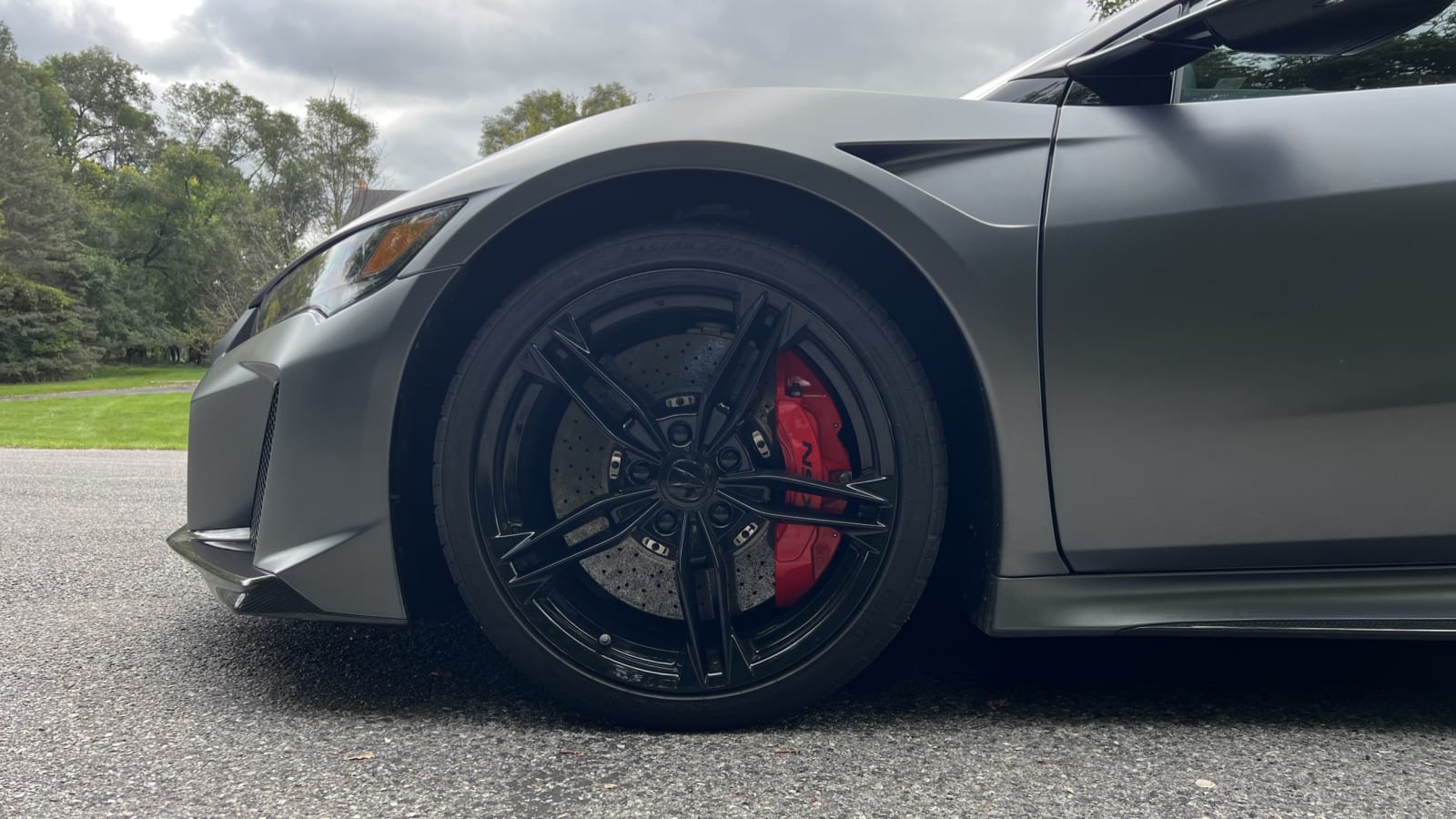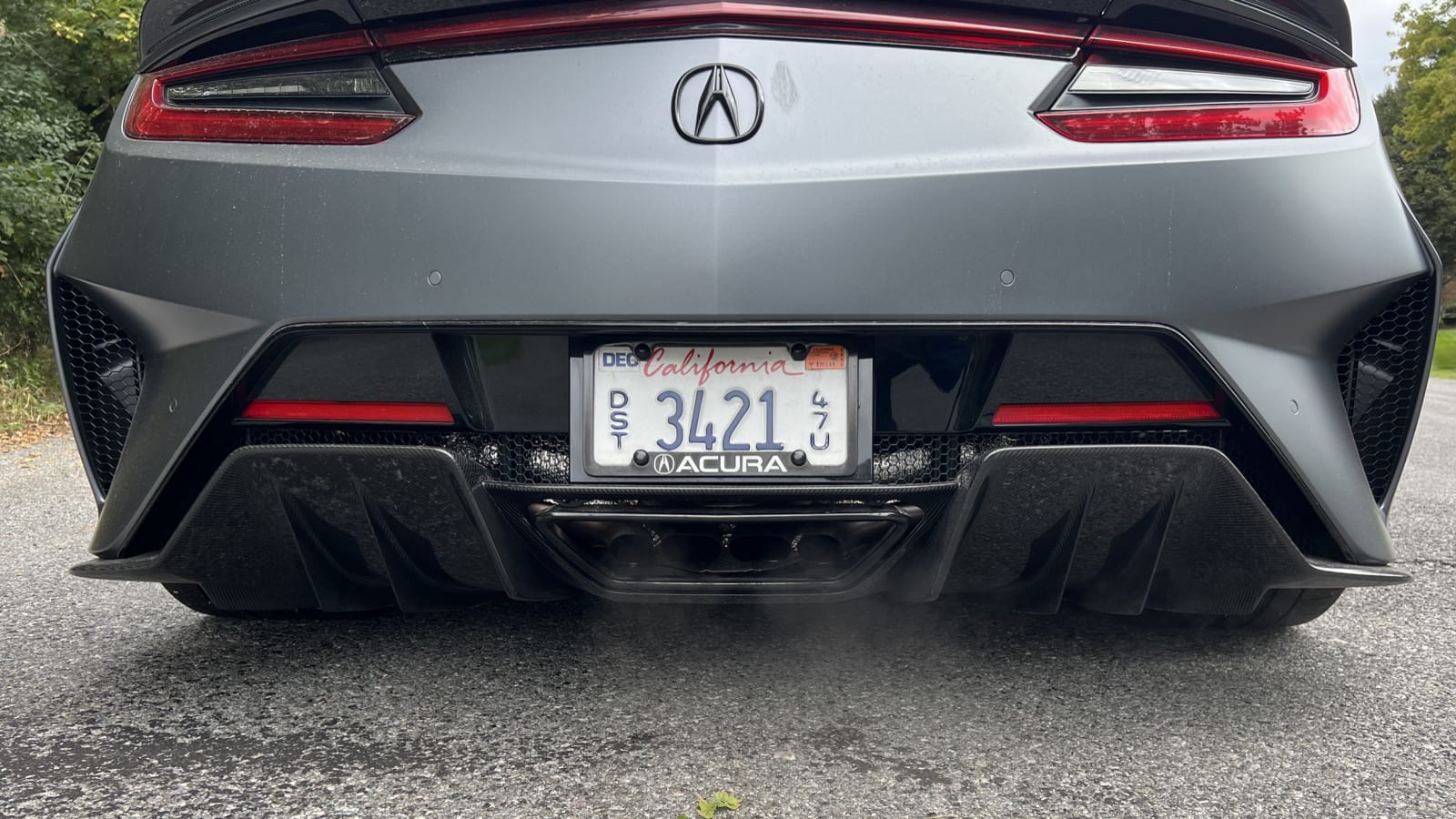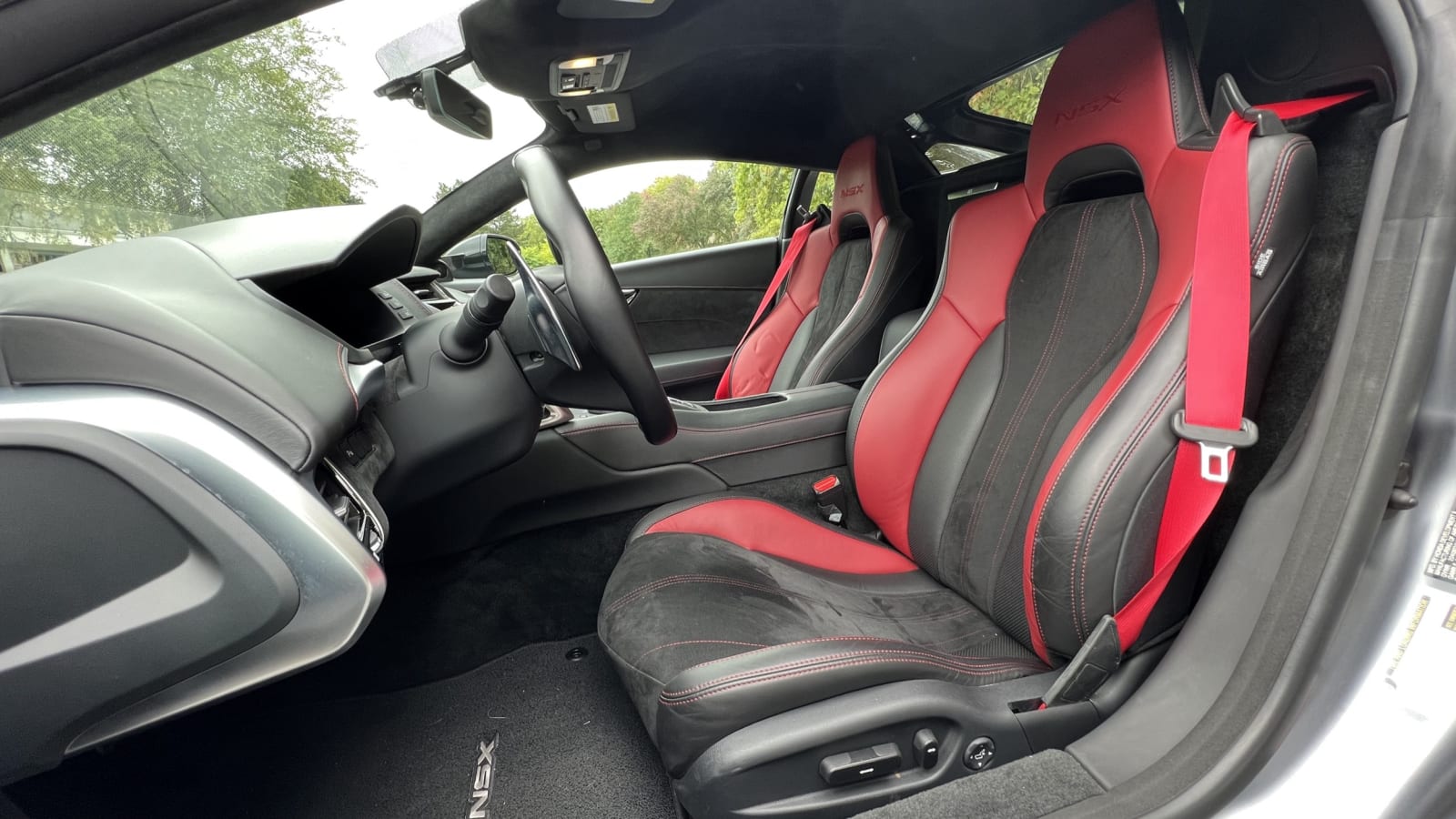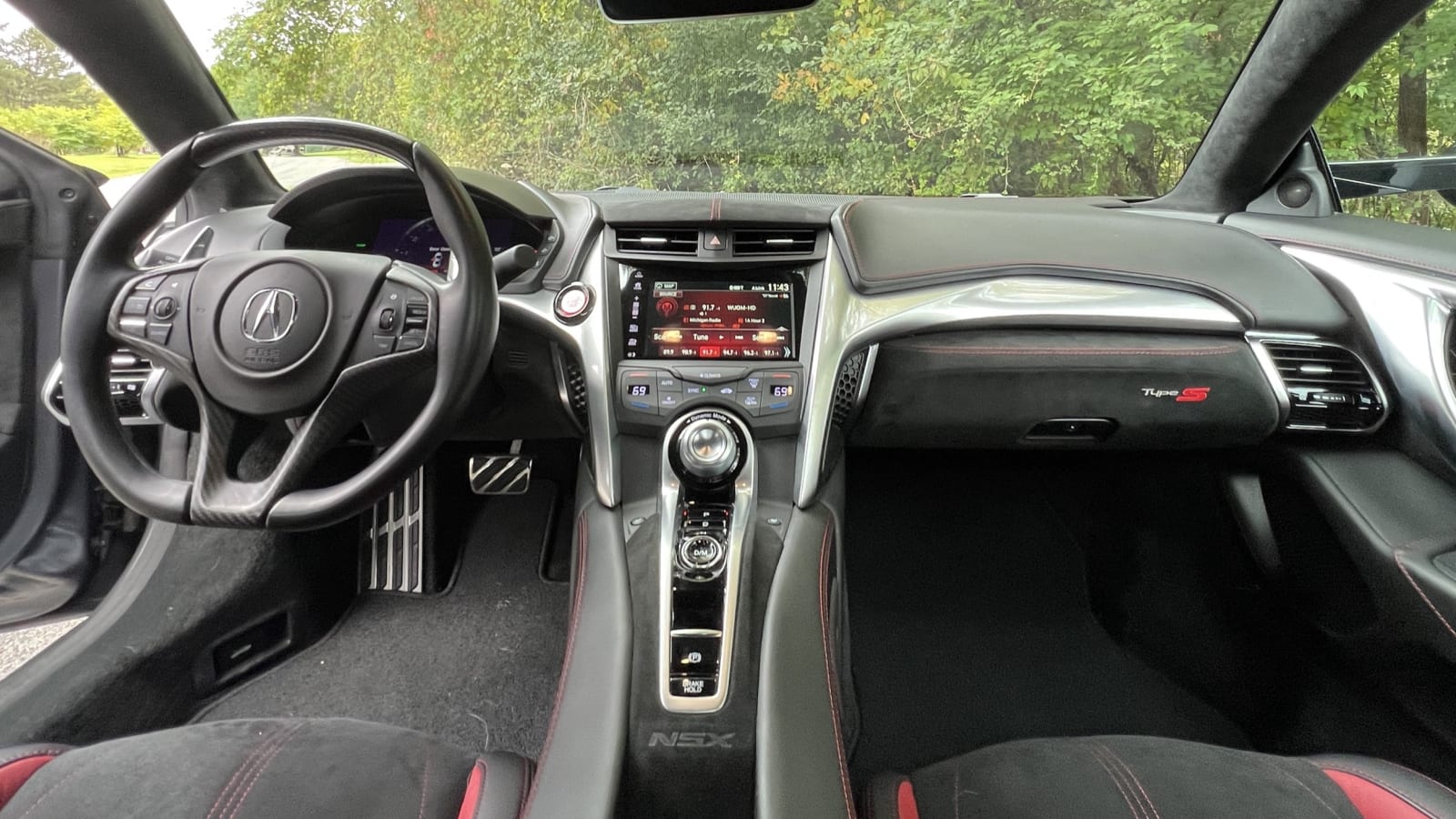2022 Acura NSX Type S Road Test Review | An ode to itself, and a gift for drivers

As we say goodbye to the modern NSX, Acura saw fit to leave the world with a parting gift. As a last blast, the hybrid supercar got a Type S variant as a mighty sendoff, with more performance and improved handling. It’s a rare treat, though, for those who could afford its $171,495 starting price. The first example sold for over a million dollars, and the remaining 299 units were scooped up in a day. Road Test Editor Zac Palmer had the once-in-a-lifetime opportunity to take the NSX Type S for a lap around Daytona, and this fall our driveway had the privilege of being graced by the car’s presence for a few days.
And this NSX looks as extreme as it drives, a sharp wedge that combines aesthetics of exoticism and straight-up evil. This one, in particular, cut a mean figure, with its matte charcoal finish, blacked-out badging, plenty of carbon fiber, sharp angles and an odd-looking engine cover covering an odd powerplant, all under glass right behind the cockpit. Though the general shape of the car is familiar to supercar fans from the mid-1970s and beyond, there’s no mistaking this Acura for something else, its honed exterior a reflection of the car’s performance.
Zac already outlined what performance upgrades set this Type S apart from the rest of the generation, but it’s good to know this wasn’t mostly about looks. Acura upgraded the V6’s twin turbochargers, improved its air and thermal management capabilities, and lowered the gear ratios of the twin electric motors up front. It even got a higher-capacity, higher-output battery powering the hybrid system. The result is a cool 600 horsepower and 492 pound-feet of torque. It’s shockingly quick, but it’s hard to tell if it’s actually faster in a straight line than the lesser NSX. The overall driving experience is improved, however.
In the Type S, Acura has achieved incredibly quick shifts from the retuned nine-speed automatic. It works well on its own, but the response you get from pulling one of the paddles almost feels as though the car had predicted your move, and is supremely rewarding in terms of driver engagement. It’s quite generous in its compliance to your whims, too, allowing you downshifts that land you higher in the rev range than you’d expect it to allow — in fact, Acura actually raised the manual downshift rev limit by 1,500 rpm. What a wonderful treat to give customers as a parting gift. It also allows you to better enjoy the full range of the engine’s soundtrack, from intake to exhaust.


And it’s an odd soundtrack, but one that elicits a quickening of the pulse, with sounds from the electric motors and the shrieky rev of the engine behind you. You also get to hear the turbochargers doing their thing, the sound arriving from over your shoulder. The one aural annoyance is the wind noise. Look at how prominently those side mirrors emerge from the junction of the NSX’s A-pillar and door frame. They’re hard to miss when glancing out the window, which makes them quite useful in maintaining your spatial awareness, but the turbulence they create as they’re pulled through the air is a constant reminder of their presence, even when your eyes are fixed on the road ahead.
As far as handling, the NSX Type S continues to deliver. It had been a couple year since I was last behind the wheel of an NSX, so it’s hard to quantify the results of the Type S’s improvements — recalibrated dampers with more variability among modes, a wider track and retuned SH-AWD system —but it does garner more handling confidence than we can ever remember. It almost feels magnetized to the road. Between the tires, the low center of gravity and the all-wheel-drive system, this NSX feels as though it’s in command of physics, with an impressive amount of lateral grip and cornering stability. The NSX Type-S practically dares you to push it harder in the curves, and, as far as we could tell, is loath to punish you for flaying around.
It’s also low to the ground, so there was a constant concern about speedbumps or transitions from road to driveway, though we never actually scraped anything. But that low-slung feeling really lets you feel connected to the road. Combined with exceptionally direct and tight steering, and the way this car wraps around you, it’s the sort of tactile, grounded joy you remember from your best laps at the kart track. In all, it’s on odd sensation for a modern car, like shaving the road in an electric razor, with a bit of a sense of open-wheel racer.


But for such a taut and involving car, it’s still comfortable going down the road, with that dynamic range of damping coming in handy when you put it into Comfort mode on those rougher stretches of pavement. The main drawback is in its size — you have to get comfortable with the confined space this cockpit affords, which might not be ideal for every body type. And despite the improvements to its driving systems, not every part of the NSX has been modernized for the car’s sendoff. The basic infotainment is kind of a relief in a time when in-car technology can feel cumbersome. That is, apart from the volume control on the unit itself — nobody likes a touch-sensitive slider, and we would have preferred an even more old-school knob instead. The scroll wheel on the left side of the steering wheel was a much better solution. Still, though, this somewhat small and tech interface is a reminder of the NSX’s age, a timestamp of the era in which the nameplate was resurrected, and now fades into the past.
The NSX is one of those beings that, as Hunter S. Thompson would say, is “too weird to live, too rare to die.” Thankfully, is seems as though we’ll get an electric NSX someday in the future. It’s unclear how long we’ll have to wait, but in the meantime, at least Chevy will be able to tide us over (we hope) with its hybrid Corvette E-Ray, which promises to deliver some of the same odd, but hair-raising high-performance driving experience. Still, it won’t replicate the unique NSX experience, which Acura faithfully amplified in its Type S finale, and which will be hard to replace in the electric age.
While we don’t doubt Acura can continue to give whatever this successor may be the appropriate supercar looks and handling, and that it will wring out an appropriate excess of power from an electric powertrain, we wonder how it could possibly capture this strange sense of otherness provided by this generation, especially as embodies in the Type S.
Related video:



